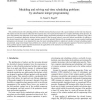Free Online Productivity Tools
i2Speak
i2Symbol
i2OCR
iTex2Img
iWeb2Print
iWeb2Shot
i2Type
iPdf2Split
iPdf2Merge
i2Bopomofo
i2Arabic
i2Style
i2Image
i2PDF
iLatex2Rtf
Sci2ools
113
click to vote
CCE
2004
2004
Modeling and solving real-time scheduling problems by stochastic integer programming
This contribution deals with scheduling problems of flexible chemical batch processes with a special emphasis on their real-time character. This implies not only the need for sufficiently short response times, but in particular the burden of in-complete knowledge about the future. To solve such problems, the application of two-stage stochastic integer programming techniques on moving horizons is proposed. They reflect the need for immediately applicable decisions and the potential of later recourse actions to cope with realized uncertainties. In addition to the classical expected value objective, simple measures of risk can be included. Motivated by an example process, some essential modeling prerequisites are discussed. As an important first step, the master scheduling problem is studied and a number of master scheduling models are presented. Large mixed-integer linear problems arise, which are well-suited for a dual decomposition approach. Numerical experiments with a problem-specif...
Related Content
| Added | 16 Dec 2010 |
| Updated | 16 Dec 2010 |
| Type | Journal |
| Year | 2004 |
| Where | CCE |
| Authors | Guido Sand, Sebastian Engell |
Comments (0)

